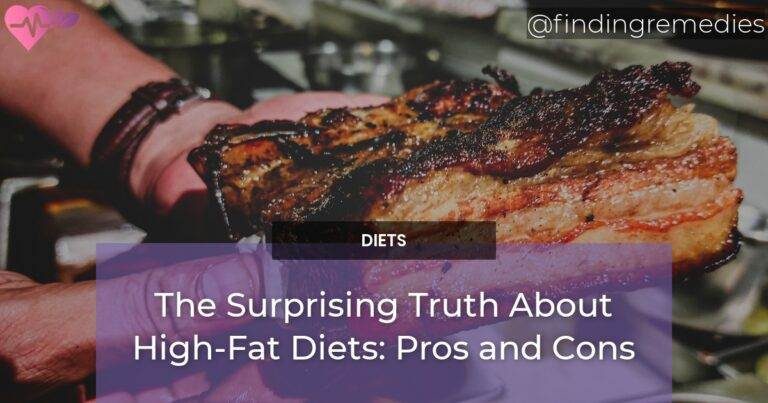When it comes to healthy eating, it can be difficult to know what nutrition advice to follow. High-fat diets have become popular in recent years, and many people are wondering if they are a safe and healthy way to eat.
In this article, we will explore high-fat diets: benefits and risks, so you can make an informed decision about whether this type of eating is right for you. We will look at the types of fats that make up a high-fat diet, the potential benefits of eating this way, and the risks to consider. With this information, you can decide if a high-fat diet is a good fit for your lifestyle and goals.
Table of Contents
High-Fat Diet Basics
What is a high-fat diet and how does it work?
A high-fat diet is a diet that is high in fat and low in carbohydrates. The idea behind a high-fat diet is to switch the body’s preferred fuel source from carbohydrates to fat. When the body does not have enough carbohydrates to use as fuel, it turns to fat for energy. This process, known as ketosis, is the basis of the ketogenic diet.
Are all high-fat diets the same?
No. While all high-fat diets are low in carbohydrates, they differ in the types of fat they allow. Some high-fat diets allow unhealthy sources of fat, such as processed foods and fast food. Other high-fat diets focus on healthy fats, such as those found in nuts, seeds, avocados, and fatty fish.
What are the best sources of healthy fats for a high-fat diet?
Some of the best sources of healthy fats for a high-fat diet include:
- Nuts and seeds, such as almonds, walnuts, and chia seeds
- Avocados
- Fatty fish, such as salmon and sardines
- Coconut oil
- Olive oil
ALSO READ
Health Benefits of a High-Fat Diet
How does a high-fat diet affect weight loss?
A high-fat diet can be effective for weight loss because it promotes the burning of fat for fuel. When the body is in ketosis, it burns fat for energy instead of carbohydrates. This can lead to weight loss over time.
Can a high-fat diet improve energy levels?
Yes. A high-fat diet can improve energy levels because it stabilizes blood sugar levels. When blood sugar levels are stable, energy levels are more consistent throughout the day.
Can a high-fat diet improve hormonal balance?
Yes. A high-fat diet can improve hormonal balance because it provides the body with the nutrients it needs to produce hormones. Hormones are made from fat, so a diet high in healthy fats can support hormone production.
Can a high-fat diet reduce inflammation?
Yes. A high-fat diet can reduce inflammation because it is high in anti-inflammatory omega-3 fatty acids. These fatty acids can reduce inflammation in the body and improve joint health.
Can a high-fat diet improve mood and mental health?
Yes. A high-fat diet can improve mood and mental health because it supports brain function. The brain is made up of mostly fat, so a diet high in healthy fats can improve cognitive function and mood.
Can a high-fat diet improve skin health?
Yes. A high-fat diet can improve skin health because it is high in antioxidants and anti-inflammatory compounds. These compounds can protect the skin from damage and reduce the risk of skin cancer.
Can a high-fat diet improve fertility?
Yes. A high-fat diet can improve fertility because it supports hormone production. Hormones are necessary for ovulation and sperm production.
How does a high-fat diet affect cellular aging?
A high-fat diet can slow down cellular aging because it is high in antioxidants. Antioxidants protect the body from damage caused by free radicals, which can accelerate the aging process.
ALSO READ
Risks and Side Effects of a High-Fat Diet
Can a high-fat diet lead to heart disease?
There is some evidence to suggest that a high-fat diet can lead to heart disease. However, this risk may be lower for diets that are high in healthy fats, such as those found in nuts, seeds, and fatty fish.
Does a high-fat diet affect brain function?
A high-fat diet can affect brain function in both positive and negative ways. While a high-fat diet can improve cognitive function, it can also increase the risk of neurological disorders, such as Alzheimer’s disease.
How does a high-fat diet affect blood sugar levels?
A high-fat diet can stabilize blood sugar levels because it is low in carbohydrates. This can be beneficial for people with diabetes.
Are there any potential side effects of following a high-fat diet?
Potential side effects of following a high-fat diet include constipation, headaches, and bad breath. These side effects are usually temporary and can be managed with proper hydration and nutrition.
Is a high-fat diet suitable for people with diabetes?
A high-fat diet may be suitable for people with diabetes because it can stabilize blood sugar levels. However, it is important to work with a healthcare provider to ensure that the diet is tailored to individual needs.
What are the best ways to track progress on a high-fat diet?
Some of the best ways to track progress on a high-fat diet include:
- Weighing yourself regularly
- Measuring your waist circumference
- Tracking your food intake with an app or journal
- Monitoring your energy levels and mood
Conclusion
A high-fat diet can have many health benefits, including weight loss, improved energy levels, and hormonal balance. However, it is important to choose healthy sources of fat and work with a healthcare provider to ensure that the diet is safe and effective. By understanding the basics of a high-fat diet and the potential benefits and risks, individuals can make informed decisions about their nutritional choices.
RELATED ARTICLES:

